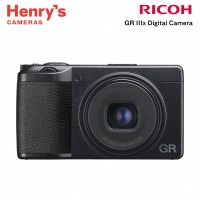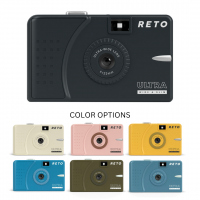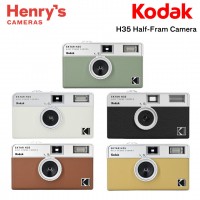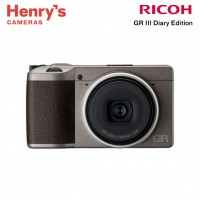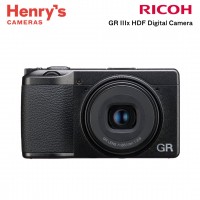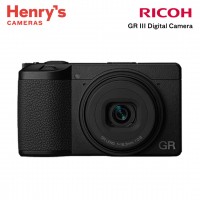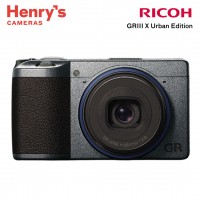Ricoh Pentax 17 Analog Film Camera
Ricoh
-
₱37,797.00
- 0% 3mos BDO, BPI, UNIONBANK, HSBC ₱12,599.00/mo.
- 35mm Half-Frame Film Camera
- HD PENTAX HF 25mm f/3.5 Traditional Lens
- Manual Zone Focus with Macro Setting
- Window Viewfinder with Dual Frame Lines
- Autoexposure, Program, and Bokeh Modes
- Built-In Flash, Flash AE Modes
- Exposure Compensation and ISO Dials
- Manual Film Advance Lever & Film Rewind
- Takes 1x CR2 3V Battery
- 2.5mm Remote Cable Switch Terminal
Exposure Control
| Flash Modes | Built-In, |
Film
| Film Size | 35mm film: ISO 50, ISO 100, ISO 125, ISO 160, ISO 200, ISO 400, ISO 800, ISO 1600, ISO 3200 |
Power
| Battery Type | One 3V lithium battery CR2, Not compatible with rechargeable CR2 type batteries |
Camera/Video Camera
| Focusing Range | Manual 9.8" to Infinity / 25 cm to Infinity |
| Shutter Speed | 1/350 to 4 Seconds |
Lens
| Maximum Magnification | Approx. 0.13x |
| Optical Design | 3 Elements in 3 Groups |
| Focal Length | 25mm (35mm Equivalent: 37mm) |
| Aperture | f/3.5 |
| Angle of View | 61° |
| Lens | HD PENTAX Lens |
General
| Battery Life | Approx. 10 cartridges* when using 36 exposure film (using fresh battery under the condition of 50% flash shots)* According to the result of RICOH IMAGING in-house testing |
| Dimension | 5 x 3.1 x 2" / 127 x 78 x 52 mm |
| Weight | 10.2 oz / 290 g (without Film and Battery) |
Pentax 17 - First Release from the Film Project
A new film camera in the age of digital, the Pentax 17 is a 35mm half-frame film camera built from the ground up. This svelte point-and-shoot is the first launch from Ricoh Imaging/Pentax's Film Project initiative and is designed using a wealth of influence from Pentax's legacy of past film cameras.
Half-Frame 35mm Film Camera
Distinct from 35mm "full-frame" cameras with a 36 x 24mm format, the Pentax 17 is a half-frame format camera with a recording area of 17 x 24mm. This smaller, more unique format has a few added benefits:
- Since the frames take up about half as much space on the roll of film, you get twice as many exposures per roll compared to full-frame format cameras. On a 36-exposure roll of film, you can expect to take about 72 exposures.
- Since the film is running horizontally through the camera, the 17 x 24mm image area is inherently vertical; the viewfinder is setup in a vertical orientation and the camera handles best when shooting vertically.
Handling and Operation
One of the key attributes of the 17 is its simplicity and ease of use; it's a true point-and-shoot that uses an accurate autoexposure system to allow you to focus on getting the shot.
- In terms of exposure variables, users are able to manually set ISO/ASA (from 50-3200), adjust exposure compensation by +/- 2 EV, and use a mode dial.
- The mode dial is divided into two distinct sections—flash off or flash on—and there is an Auto mode that choose whether or not to use flash depending on the lighting conditions.
- Within the flash on section, there is a choice between a Program auto with flash and a slow-sync with flash settings.
- With the flash off, Program auto, bulb, and slow shutter speed settings can be used, as well as a unique Bokeh mode that prioritizes use of the f/3.5 maximum aperture for the shallowest depth of field.
- The top plate also includes the manual film rewind knob; the shutter release button, which is surrounded by the On/Off switch; the film advance lever; and the film counter window.
- The viewfinder is placed in the middle of the body and has a simple window design with brightline frame lines. The frame lines include a close-up compensation notch for more accurate framing when using the closest focusing zone.
- The front of the camera has a knurled handgrip, which can be removed to reveal the single CR2 3V battery that powers the camera's meter and flash.
- Next is the lens; integrated in the front of the lens's housing is the light meter and the lens also has 40.5mm threads to accept filters. Since the meter is within the lens housing, filter factors will automatically be accounted for when using autoexposure.
- The built-in flash on the front of the body has a guide number of 20' at ISO 100 and a recycle time of about 9 seconds. LEDs near the viewfinder display when the flash is recharging and when it is ready for use.
- The back of the camera has a small slot for inserting notes or a piece from a film box to remind you of the loaded film stock. Also, near the top is a 2.5mm port, which can be used with an optional CS-205 cabled remote shutter release. And, on the bottom of the camera, there is a 1/4"-20 tripod mount and the film rewind button.
HD PENTAX HF 25mm f/3.5 Traditional Lens
The fixed prime lens is an HD PENTAX HF 25mm f/3.5 Traditional; it's a slightly wide-angle lens, equivalent to the field of view of a 37mm lens in full-frame, offering impressive sharpness and color rendering. It features Pentax's contemporary HD anti-reflective coating, helping to boost contrast and clarity.
The lens focuses using a manual six-stage zone focusing method:
- Macro/Flower: 0.82' / 0.25 m
- Close-Up/Knife & Fork: 1.7' / 0.5 m
- Single Person: 4' / 1.2 m
- Two People: 5.6' / 1.7 m
- Group of People: 10' / 3 m
- Mountain/Infinity: ∞
The icons are visible on top of the lens, which can also be seen when looking through the viewfinder, and the specific measurements are printed on the front of the camera body.
Legacy in Design
Despite being a brand-new camera, the Pentax 17 borrows many legacy details from past Pentax cameras to inform its distinct design: the film rewind knob is taken from the Pentax LX, the ISO dial from the SP, the flash and shutter release from the KP, the lens housing from the Espio Mini, the front logo text from the 67, the knurled battery cover from the DA WR series of lenses, the film advance lever from the Auto 110, and the magnesium alloy top plate from a special edition LX. Also, the viewfinder includes Pentax's own classic logo along with the Asahi AOCo logo and a film plane indicator taken from their line of DSLRs.

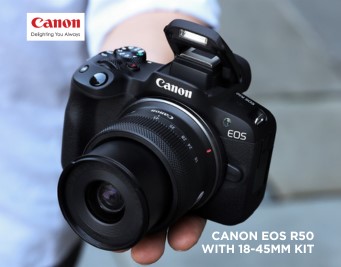
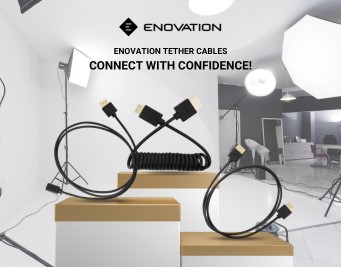



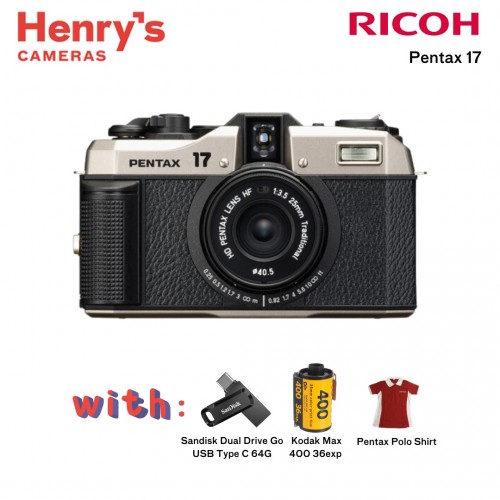
-90x90.jpeg)
-90x90.jpeg)
-90x90.jpeg)
